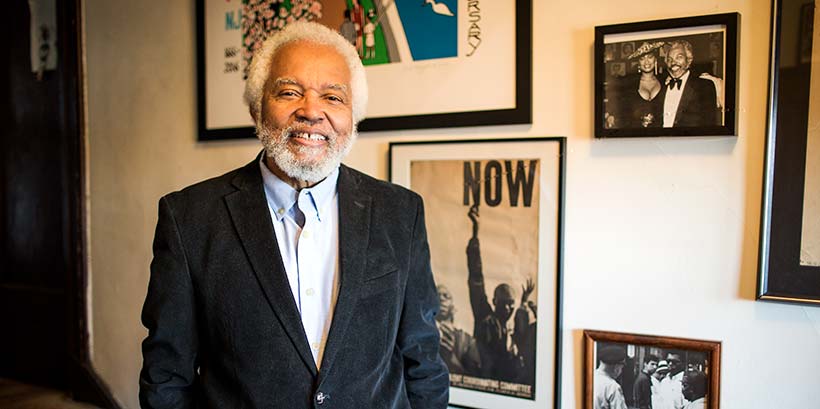The Activist

Once named among Ebony magazine’s “100 Most Influential Blacks in America,” Junius Williams ’65 became an indispensable change-maker in Newark, N.J., and the youngest president ever of the National Bar Association, the country’s oldest association of African-American lawyers.
His incline to influence was steep. In segregated Richmond, Va., he grew up “with the knowledge that white is power, and uppityness had its consequences,” he writes in his 2014 book Unfinished Agenda: Urban Politics in the Era of Black Power. Williams arrived at Amherst in 1961 with a full scholarship but felt unprepared for what he calls the “process” of higher education, in comparison to most white, wealthy peers. “My problem was that I had to learn the process and master it at the same time, while my classmates had only to master it.”
To that end, he studied six hours a day, six days a week, and tried to fit in. “The smile was both my offense and my defense,” writes Williams of his time here, when he became the first black student at Amherst to join Alpha Delta Phi. In 1963 he traveled to the March on Washington. In the winter of 1965 he helped organize a conference on civil rights—even calling up Malcolm X to come and speak. (The leader said yes, in spite of the modest honorarium, but his plane was fogged in that day, and he missed the event.)
That spring, Williams joined students from Amherst, Smith and UMass to head to Montgomery, Ala., to march on the state capitol, on the front lines with the Student Nonviolent Coordinating Committee. In South Carolina, the police pulled over the car—they were trying to head off college kids journeying south in solidarity—and the black students hid under blankets as Fred Aronow ’67, who is white, thought fast and lied that they were on their way to Florida for a beach vacation. Williams and Aronow were both later arrested at the march.
Williams was the second Wade Fellow, serving in 1979–80—which meant he often spoke to students about the implications of the 1978 Supreme Court case in which a white student sued the University of California for denying him admission. “I told them that affirmative action was not over but that it was going to be harder, because racism was on the rebound,” Williams recalls. “They were interested, because this was their future. They knew the games that would be in play with their lives, and Amherst was just the first step, but not the last, to get to some kind of professional advancement and security.”
Before Yale law school, Williams went to Newark to help mobilize African-American residents on issues of housing, schools and police abuse. He later launched the Newark Area Planning Association, which fought against the city’s gentrifying urban renewal plans. He became executive director of the Newark Housing Council and then signed on as campaign coordinator for Kenneth
Gibson, Newark’s first black mayor.
In 1973, Williams opened his own law firm, later working on Jesse Jackson’s presidential campaign. At the National Bar Association, he appeared in front of the United Nations to present a paper analyzing the fledgling constitution of Zimbabwe. The paper became the U.N.’s official position.
Over the decades, Williams has kept up his advocacy, gone on speaking tours, taught and written his book. “I would love to be a Wade Fellow now, because I have a lot more to offer than I did in 1979,” says Williams, in sight of a framed Wade Fellow event poster in his office. “People like me, who came through the movement, we know how to survive. I have always been able to rebound, fall down, rebound and go on from there. That’s the skill set that African-American and brown people of all descriptions need to have.”